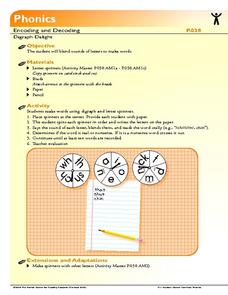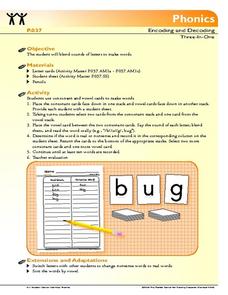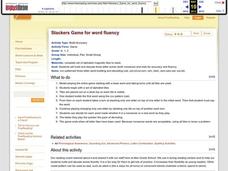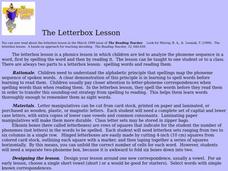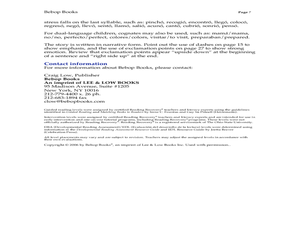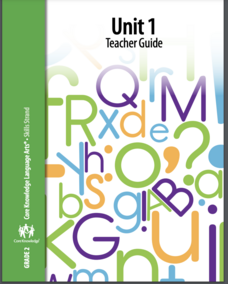Florida Center for Reading Research
Phonics: Encoding and Decoding, Digraph Delight
There are three spinners to use in this phonic activity. Spinner one contains digraphs, spinner two contains vowels, and spinner three contains consonants. Learners spin each spinner, write down the letters they get, blend them to make a...
Curated OER
Phonics: Read and Write Irregularly Spelled Words
Kids practice saying and identifying words that have irregular spellings. They consider the words said, come, and does by breaking them down into how they are commonly pronounced versus how they "should" be pronounced given their spelling.
ABCya
Word BINGO
Practicing sight words is all fun and games with this app! Users hear, read, and spell words off the Dolch Word List. But that's not all! Players also get to create their own avatar, collect BINGO bugs, view their scores, and more within...
University of Texas
Alphabetic Understanding, Phonics, and Spelling
Have your youngsters reading in no time with with collection of literacy activities and lessons. Starting with a basic understanding of the alphabet, this unit progressively builds students' phonemic awareness and ability to decode...
Florida Center for Reading Research
Word Steps
Blending basic CVC letters to make words is one of the first steps to independent reading. Provided here are several images of stairs and several letters to cut and arrange. The learner rearranges the letters to form CVC patterns, sounds...
Florida Center for Reading Research
Phonics: Encoding and Decoding, Three-In-One
Scholars use the provided pack of alphabet cards to construct basic CVC words, then write down each word they make in one of two columns. Column one is for real words and column two is for nonsense words.
Curated OER
Wide Mouthed Frog Memory or Wide Mouthed Frog Sight Word Game
How appropriate is playing a game of memory to help children memorize their sight words! Offering fun frog-themed flash cards and instructions for playing two different sight word games, this would make a great addition to the...
Florida Center for Reading Research
Phonics: Encoding and Decoding, Make-A-Word
Little learners place a picture card on a magnetic board, say the name of the object on the card, then sift through alphabet magnets to find and spell the word they said.
Florida Center for Reading Research
Phonics: Encoding and Decoding, A Digraph A Word
Learners view a series of images, then choose digraphs, consonants, and vowels to spell out the object's name on each card.
Florida Center for Reading Research
Phonics: Encoding and Decoding, Vowel Stars
Learners are given a star; each star contains a c_c form in the center and vowels on each point. They use the vowels to fill in the blank between the consonants making a simple CVC word. They write each word they make on a piece of...
Florida Center for Reading Research
Phonics: Encoding and Decoding, Letter Cube Blending
Emergent readers use a letter cube to identify, blend, and make words. They roll each of the three-letter cubes, mark down the letters they rolled, then blend the letter sounds together to make a word. They record each word on a...
Curated OER
Irregular Words Fluency, Speed Battle
Let's play a game! Explore language arts by participating in a flash card reading game. Kids utilize flash cards that have a number of irregular words written on them. They collaborate in pairs and compete as they attempt to pronounce...
Curated OER
Phonics: Decode and Write Words with the “Silent e”
What happens when I add an 'e' to the word mad? It becomes made! Decoding and writing words with the silent e is the lesson for today. The class discusses what the e can do to a cvc word, then they practice adding e's to various words in...
Curated OER
Stackers Game for Word Fluency
Explore words by building and decoding three-letter words. Real or nonsense words can be formed with the alphabet tiles. Practice fluency and blending sounds with CVC patterns.
Curated OER
Phonics: Decode and Write Words with Blends
Kids see, say, then count the phonemes they hear in a series of simple words. They practice counting phonemes with the teacher, then sound out the same word on their own. As they count each phoneme they write it down on their paper. A...
Curated OER
Affix This
Wait, what am I supposed to affix? Explore the concept of roots/affixes with your class. They use discussion questions to discover the meaning and usage of specific roots and affixes. They watch a video explaining Latin and Greek roots...
Curated OER
The Letterbox Lesson
Students analyze phoneme sequence in a word. They spell words using phoneme analysis and read new words using phoneme analysis.
Curated OER
Guided Reading with Elizabeti's Doll
Practice reading strategies using Elizabeti's Doll by Stephanie Stuve-Bodeen. Readers utilize decoding and comprehension strategies before, during, and after reading the story. A detailed list of text features, high frequency words,...
Curated OER
Irregular Word Fluency, Smack the Wall
Students practice decoding irregular words. In this irregular word fluency instructional activity, students read the irregular words from the word wall. Students listen to the teacher read an irregular word and smack the word on the word...
Curated OER
Making Words
Third graders spell words and define homophone. In this making words lesson, 3rd graders decipher words from letter strips in an effort to identify the "secret word". Students use a set of letters to spell different words.
Curated OER
Animated Alphabet
Students explore English by completing an interactive language history activity. In this word recognition lesson, students discuss word formations and the phonetic relationship between letters. Students identify the origin of individual...
Texas Center for Learning Disabilities
Teacher Templates
Letter by letter, sound by sound, monitor the growth of your emergent readers with these assessment templates. Adaptable to the needs of individual students, these one-on-one assessments focus on children's ability to identify...
Core Knowledge Foundation
Second Grade Skills Unit 1: The Cat Bandit
For twenty-two lessons over five weeks, scholars practice sound-spelling correspondence, spelling patterns, tricky words, and reading decodable text. Assessments aid in small group formation and gauge comprehension. Lessons begin with a...
Core Knowledge Foundation
Second Grade Skills Unit 4: The Job Hunt
Second graders practice skills, including spelling, grammar, and reading. Pupils examine vowel sounds and tricky words, nouns, and verbs. They begin the writing process by drafting a persuasive letter and decoding texts.
